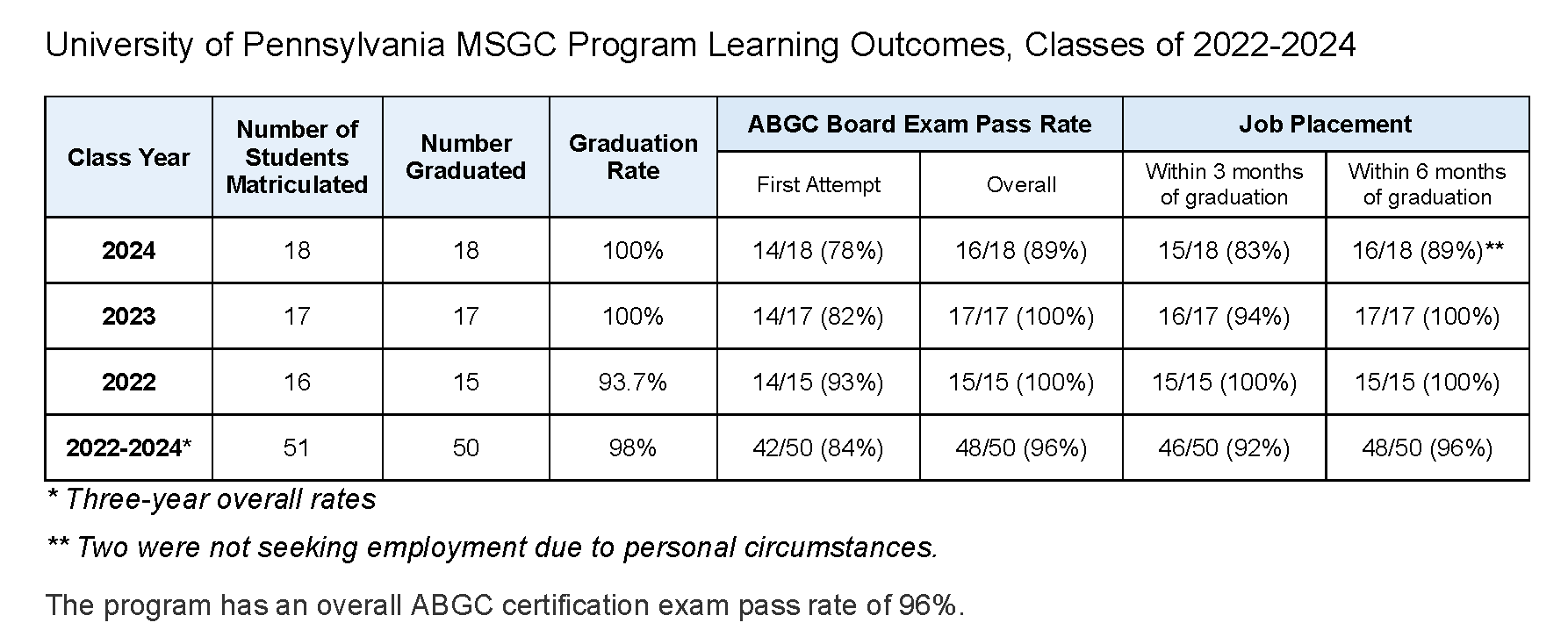Why study genetic counseling at Penn?
The University of Pennsylvania Master of Science in Genetic Counseling program provides a comprehensive educational environment for future genetic counselors that balances the importance of patient-focused care, scientific knowledge, research, and innovative technology. Housed within a dynamic, world-renowned medical center with an outstanding faculty and access to clinical opportunities at some of the nation's premier healthcare facilities, we prepare students to be successful genetic counseling professionals in the rapidly evolving field of genetics.
- Our internationally recognized Penn faculty are actively engaged with issues relevant to genetic counseling diagnostics and therapeutics, which offers a unique opportunity to establish a strong curriculum across disciplines including public health, bioethics, translational medicine, and social policy and practice. These programs foster novel opportunities for student research.
- The curriculum is structured to include clinical internships and professional experiences in all semesters so that didactic learning can be quickly applied and counseling skills tested and practiced throughout the course of the program. First year students begin their clinical rotations in their first semester in the program.
- More than 130 experienced clinical supervisors, over 110 at Penn and CHOP alone, work with our program in a wide array of clinical sites, affording students a more individualized experience tailored to their interests.
- Penn Medicine has long been a leader in creating innovative and cutting-edge programs that enhance the roles of genetic counselors.
- The Penn Telegenetics Program is one of the national leaders in NIH funding and in researching new technologies to improve delivery of this critical service.
- Cutting edge programs at the Children's Hospital of Philadelphia are clinical rotation sites, including the Center for Fetal Diagnosis and Treatment, the Mitochondrial Medicine Frontier Program, the 22q and You Center, and the Roberts Individualized Medical Genetics Center.
- The Leadership Education in Neurodevelopmental and Related Disabilities (LEND) fellowship provides education for all of our students and an intensive fellowship for at least two students each year to develop leadership skills in a multidisciplinary environment.
- An elective rotation allows students to focus on particular areas of interest
- The Penn Medicine Standardized Patient Program provides outstanding practice opportunities at all stages of learning.
- The program has a strong emphasis on clinical, translational, and implementation research.
- The unparalleled resources at Penn provide numerous opportunities to introduce students to the commercial and policy contexts of genetic counseling and testing processes and to help them more critically understand how genetic counseling practice continues to evolve.

- The success of our graduates means that students who attend the program are well placed for success in their professional careers.
-
Mentorship relationships are central to success in the program. All incoming students are matched with student mentors (Penn Pals) from the second-year class as well as with genetic counselors practicing in the Penn and CHOP genetics community.
- Philadelphia, the City of Brotherly (and Sisterly) Love, is a vibrant, diverse city, full of history, restaurants, parks, cultural attractions, and exciting sports teams. The West Philly location of the Penn campus puts you right in the middle of it all.


